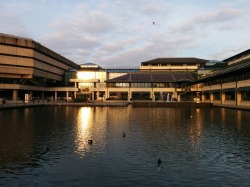Student Travel Diary

From 20-29 February of this year, I travelled to London, England, in order to conduct archival research for my master’s thesis on John Reeves (1752-1829), a man whose several political careers have garnered him two opposite reputations on either side of the North Atlantic.
John Reeves is better known to Newfoundlanders as the Island’s first Chief Justice, and as the author of the History of the Government of Newfoundland (1793). But, he is also well-known to historians of the British loyalist reaction against the French Revolution as the founder of the Association for Preserving Liberty and Property against Republicans and Levellers (“APLP”), and as the author of the “ultra-Tory” Thoughts on the English Government (1795-1800).
While in London, I divided my time between the the British Library and the National Archives, in order to avail myself to the archival sources not available in St. John’s.
While there, I was able to photograph every volume of the “Association Papers”—the correspondence to and from Mr. Reeves, in his capacity as Chairman of the APLP, from November 1792 to June 1793. As this organisation was founded so soon after Reeves’s final return from Newfoundland, these documents are a necessary foundation to any reconciliation of his conservatism at home, and the liberal government he helped design in Newfoundland.
The papers of the Duchy and Palatinate of Lancaster—over whose manorial court, in the Savoy district of London, Reeves presided as “chief justice” from roughly 1793 to 1802—were not particularly fruitful. Two letters, however, were surprising finds: the first, showing another man’s umbrage at having been passed over for Reeve’s job in the Savoy; the second, showing Reeves’s indignation that his letters addressed to Lord Hawkesbury—Reeves’s other boss at the Board of Trade (the future Colonial Office)—were being answered by deputies and underlings.
In addition to other findings, I am most excited about “Mr. Reeves’s Report On Sedition &c.” from April of 1794—submitted one month before the arrests of the leaders of the London Corresponding Society (a radical reformist group) on the charge of High Treason. I must confess, I was not expecting to find such a clear summary of Reeves’s impressions—and detailed knowledge—of radical reformers. This report is thus an incredible missing link between his 1791 and 1792 reports on Newfoundland, his 1793 History of Newfoundland, and the Thoughts on the English Government that saw Reeves himself charged with seditious libel.
The tentative sketch of John Reeves that these documents provide are all exciting finds that will allow me to conduct a much more thorough re-evaluation of Reeves’s career at Newfoundland.
I would therefore like to express my gratitude to the Scholarship in the Arts Program for its generous award that allowed the majority of my expenses on this trip to be covered; without external funding, this trip would have been impossible. The brief conversations that I was also privileged to hold with locals in London and Kew Gardens about the nature of my research, and the curiosity and encouragement they expressed to me—a reflection of the support and encouragement I’ve received from friends and interested acquaintances in St. John’s—have left me all the more convinced that I am researching a story worth telling.
Andy Post, B.A., M.A.